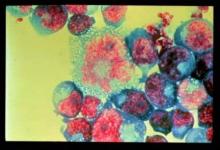A large European study published in the journal AIDS has confirmed that HIV-positive status is a strong risk factor for an adverse tuberculosis treatment outcome.
Researchers at the Robert Koch Institute in Berlin analyzed the treatment outcomes of 61,138 TB cases reported from nine European countries during 2010-2012, and investigated the effect of HIV on TB outcomes using multilevel and multinomial logistic models. They also considered the interaction between HIV and multidrug-resistant TB (MDR-TB).
According to lead author Basel Karo and his colleagues, 5.5% of the TB cases analyzed were HIV positive. HIV coinfected cases had a significantly lower TB treatment success rate, compared with HIV-negative cases (57% vs. 79%). In the multilevel model adjusted for age and an interaction with MDR-TB, HIV was significantly associated with lower treatment success in all MDR strata, while in the multinomial regression model, HIV-positive cases had significantly higher relative risk ratio for death. Mr. Karo and coauthors said an increased risk of still being on treatment (more than 12 months for non-MDR-TB; more than 24 months for MDR-TB) is another indicator of less successful TB regimens in HIV-positive patients. The research team did not find any significant association between HIV and TB treatment failure.
Negative treatment outcomes may be explained by difficulties in diagnosis of TB, sometimes due to “alternation of the clinical manifestation of TB and lack of a rapid and sensitive TB diagnostic test” in HIV coinfected patients, which may lead to a delayed diagnosis and treatment. TB treatment of TB in HIV coinfected patients also “presents with major challenges regarding the drug interactions between the rifamycins and some antiretroviral agents, overlapping toxic effects, and the occurrence of immune reconstitution inflammatory syndrome (IRIS),” the investigators said.
The results of the trial should encourage future studies “including randomized clinical trials to investigate the optimal duration of TB treatment in HIV coinfected individuals,” Mr. Karo said.
Read the study in the journal AIDS (AIDS. 2016 Jan 8. doi:10.1097/QAD.0000000000001016).
On Twitter @richpizzi


